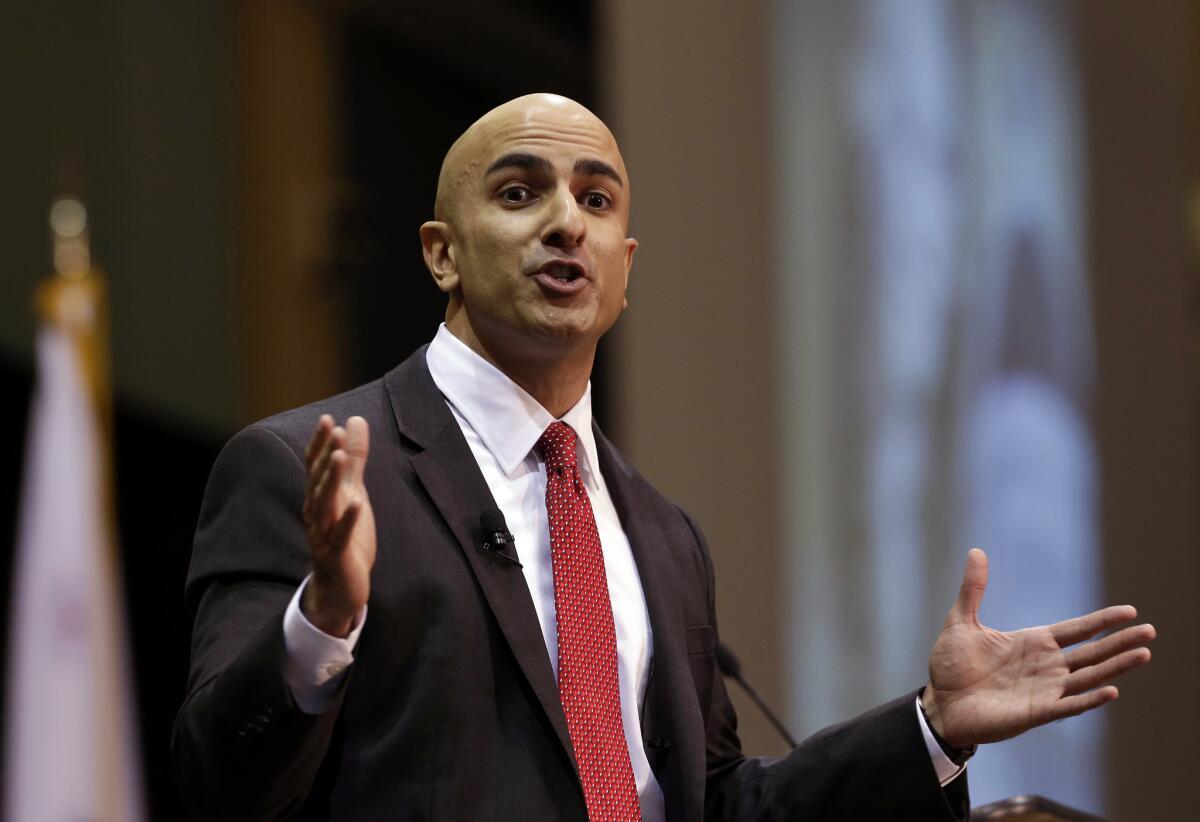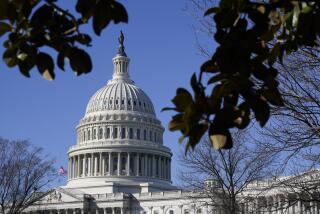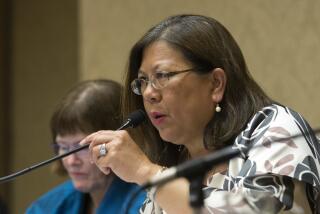Neel who? Again, a wealthy candidate reaches for a California win

Neel Kashkari announced his run for governor of California on Tuesday and then turned to the crowd to take a commemorative photo.
“Say cheese!” the multimillionaire Republican declared.
And all around the state of California, political veterans muttered: We’ve seen this picture before.
A wealthy novice candidate jumps into a race for the top seat available, sending multiple negative messages at once: That money can buy votes. That, as if afflicted with pinnacle envy, the only race that counts is the biggest one. That an outsider with no political experience is superior to a veteran of the state’s sublimely complicated political environment.
Strategist Garry South, who dispatched a similar candidacy by Democratic financier Al Checchi when he ran Gray Davis’ successful 1998 campaign, gently mocked via Twitter.
“Neel, buddy, wanna get together so I can share some CA political history lessons with ya? Could save you a lot of money,” he jibed.
The swirl of moneyed candidates competing for political success in California is boggling, just counting those who have run recently. In 2010, Republican businesswoman Meg Whitman spent a mind-bending $177 million — $144 million of it her own money — in an unsuccessful bid for the governorship. She was defeated by Jerry Brown, who parlayed name recognition and a mere $36 million to victory.
Republicans aren’t the only wealthy candidates who have found the political universe not nearly as inviting as the business one. Democrat Checchi blew through $40 million of his own money just in the gubernatorial primary; in a bad echo eight years later, Democratic Silicon Valley entrepreneur Steve Westly spent almost $44 million in his unsuccessful gubernatorial primary race, most of it his own. (Hard as it is to fathom, that level of spending doesn’t always amount to much more than couch-cushion change for the uber-wealthy. Over the relatively brief course of his losing campaign, Checchi made his money back on increases in the price of his Northwest Airlines stock. Whitman’s donations to her ambitious campaign were only a small chunk of her billion-dollar holdings.)
Actor Arnold Schwarzenegger’s success in capturing the governor’s office seems to have spurred some of the subsequent first-time candidates, all of whom have glided past the idiosyncrasies of his win: It occurred in a weirdly timed special election that spared the moderate Republican the crucible of a GOP primary dominated by the party’s right flank. It focused on an exceedingly unpopular incumbent reeling from a statewide electricity crisis. And, not least, the challenger was Arnold Schwarzenegger, a man with far less baggage then than now.
Not all campaigns are the same, but wealthy candidates typically trip over the same stumbling blocks.
They often have not voted much, a fairly obvious display of civic disinterest. (The San Francisco Chronicle reported Tuesday that the 40-year-old Kashkari, of Laguna Beach, had failed to vote in nearly half the elections for which he was eligible.)
They tend to have past business experiences that, while perhaps seen as rational in the corporate world, come off poorly in the real one. (“When you’re talking about massive layoffs, which we did ... perhaps the work needs to be done somewhere else?” Republican U.S. Senate hopeful Carly Fiorina said in a devastating ad aired by incumbent Democrat Barbara Boxer’s team in 2010; the comment came from a 2008 interview in which the former Hewlett-Packard chief discussed shipping 30,000 jobs overseas.)
And the fact that they have money to burn can breed a lack of efficiency in their campaigns. (Whitman’s campaign spent 18 times more money on fundraising events in 2010 than did Brown’s, including events at Torrey Pines and the Ritz-Carlton in New York. Still, Brown easily outraised her when Whitman’s own contributions weren’t counted.)
That brings up a wrinkle that Kashkari will have to smooth: The former Goldman Sachs investment banker and Treasury Department official is coming onto the stage as the wealthy candidate in the race — the alternative at the moment is Assemblyman Tim Donnelly of Twin Peaks — but he has acknowledged that he does not have the wherewithal to finance the campaign himself.
Political strategists suggest that his path is a difficult one for myriad reasons. Kashkari is running to be the Republican nominee for governor in a state where less than 30% of the voters share that affinity. His role overseeing President Bush’s $700-billion bank bailout may irk Democrats and even some in his own party, as could his support for same-sex marriage and abortion rights. Were he to succeed, he would be running in November against Brown, whose success in helping balance the state’s perennially deficit-plagued books has boosted his popularity.
Kashkari’s wealth alone is not disqualifying, as several California elected officials can attest. The latest annual ranking by The Hill said that Rep. Darrell Issa of Vista was the wealthiest member of Congress, with $355 million in holdings; Sen. Dianne Feinstein came in ninth at nearly $42 million. (Brown, for that matter, isn’t exactly broke, even if an image of frugality has shrouded him since his first incarnation as governor in the 1970s.)
Still, Kashkari will have to convince voters that he sees things through their eyes, even if his bank account is substantially larger than most.
“Voters are skeptical of all politicians, but wealthy politicians have a higher bar to cross,” said Rose Kapolczynski, Boxer’s chief strategist. “They have more of a hurdle to prove that they understand the lives of everyday voters.”
Not voting ranks high on the list of things that rankle voters, she said, and represents a serious threat to Kashkari.
The newly minted candidate said in Tuesday’s announcement that he had a single focus: “Jobs and education.” He said nothing about his own wealth, nor about the precedent set by so many affluent candidates who tried, and lost.
But several weeks back, in an interview with the Sacramento Bee, he already seemed fed up with being compared to anyone else.
“Oh, give me a break,” he said. “You’re comparing this to Meg? Give me a break.”
Twitter: @cathleendecker
More to Read
Start your day right
Sign up for Essential California for news, features and recommendations from the L.A. Times and beyond in your inbox six days a week.
You may occasionally receive promotional content from the Los Angeles Times.







